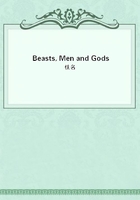
第61章 THE BREATH OF DEATH(1)
We arrived at Uliassutai on the day of the return of the detachment which had gone out to disarm the convoy of Wang Tsao-tsun. This detachment had met Colonel Domojiroff, who ordered them not only to disarm but to pillage the convoy and, unfortunately, Lieutenant Strigine executed this illegal and unwarranted command. It was compromising and ignominious to see Russian officers and soldiers wearing the Chinese overcoats, boots and wrist watches which had been taken from the Chinese officials and the convoy. Everyone had Chinese silver and gold also from the loot. The Mongol wife of Wang Tsao-tsun and her brother returned with the detachment and entered a complaint of having been robbed by the Russians. The Chinese officials and their convoy, deprived of their supplies, reached the Chinese border only after great distress from hunger and cold. We foreigners were astounded that Lt.-Colonel Michailoff received Strigine with military honors but we caught the explanation of it later when we learned that Michailoff had been given some of the Chinese silver and his wife the handsomely decorated saddle of Fu Hsiang. Chultun Beyli demanded that all the weapons taken from the Chinese and all the stolen property be turned over to him, as it must later be returned to the Chinese authorities; but Michailoff refused. Afterwards we foreigners cut off all contact with the Russian detachment. The relations between the Russians and Mongols became very strained. Several of the Russian officers protested against the acts of Michailoff and Strigine and controversies became more and more serious.
At this time, one morning in April, an extraordinary group of armed horsemen arrived at Uliassutai. They stayed at the house of the Bolshevik Bourdukoff, who gave them, so we were told, a great quantity of silver. This group explained that they were former officers in the Imperial Guard. They were Colonels Poletika, N. N.
Philipoff and three of the latter's brothers. They announced that they wanted to collect all the White officers and soldiers then in Mongolia and China and lead them to Urianhai to fight the Bolsheviki; but that first they wanted to wipe out Ungern and return Mongolia to China. They called themselves the representatives of the Central Organization of the Whites in Russia.
The society of Russian officers in Uliassutai invited them to a meeting, examined their documents and interrogated them.
Investigation proved that all the statements of these officers about their former connections were entirely wrong, that Poletika occupied an important position in the war commissariat of the Bolsheviki, that one of the Philipoff brothers was the assistant of Kameneff in his first attempt to reach England, that the Central White Organization in Russia did not exist, that the proposed fighting in Urianhai was but a trap for the White officers and that this group was in close relations with the Bolshevik Bourdukoff.
A discussion at once sprang up among the officers as to what they should do with this group, which split the detachment into two distinct parties. Lt.-Colonel Michailoff with several officers joined themselves to Poletika's group just as Colonel Domojiroff arrived with his detachment. He began to get in touch with both factions and to feel out the politics of the situation, finally appointing Poletika to the post of Commandant of Uliassutai and sending to Baron Ungern a full report of the events in the town.
In this document he devoted much space to me, accusing me of standing in the way of the execution of his orders. His officers watched me continuously. From different quarters I received warnings to take great care. This band and its leader openly demanded to know what right this foreigner had to interfere in the affairs of Mongolia, one of Domojiroff's officers directly giving me the challenge in a meeting in the attempt to provoke a controversy. I quietly answered him:
"And on what basis do the Russian refugees interfere, they who have rights neither at home nor abroad?"The officer made no verbal reply but in his eyes burned a definite answer. My huge friend who sat beside me noticed this, strode over toward him and, towering over him, stretched his arms and hands as though just waking from sleep and remarked: "I'm looking for a little boxing exercise."On one occasion Domojiroff's men would have succeeded in taking me if I had not been saved by the watchfulness of our foreign group.
I had gone to the fortress to negotiate with the Mongol Sait for the departure of the foreigners from Uliassutai. Chultun Beyli detained me for a long time, so that I was forced to return about nine in the evening. My horse was walking. Half a mile from the town three men sprang up out of the ditch and ran at me. I whipped up my horse but noticed several more men coming out of the other ditch as though to head me off. They, however, made for the other group and captured them and I heard the voice of a foreigner calling me back. There I found three of Domojiroff's officers surrounded by the Polish soldiers and other foreigners under the leadership of my old trusted agronome, who was occupied with tying the hands of the officers behind their backs so strongly that the bones cracked. Ending his work and still smoking his perpetual pipe, he announced in a serious and important manner: "I think it best to throw them into the river."Laughing at his seriousness and the fear of Domojiroff's officers, I asked them why they had started to attack me. They dropped their eyes and were silent. It was an eloquent silence and we perfectly understood what they had proposed to do. They had revolvers hidden in their pockets.